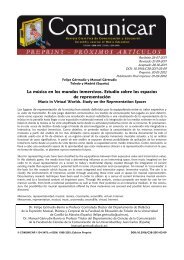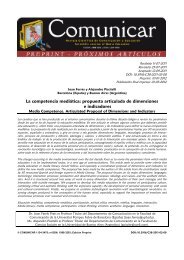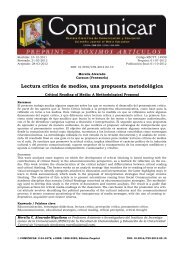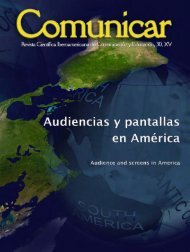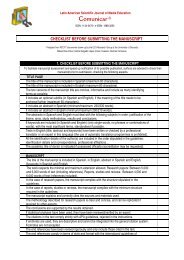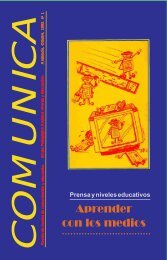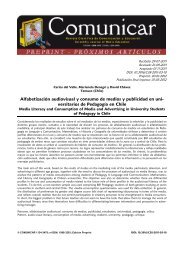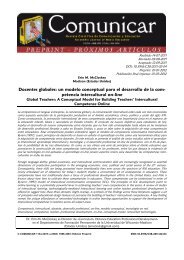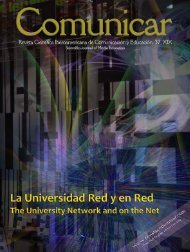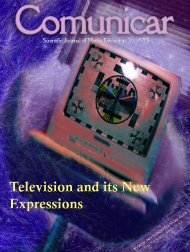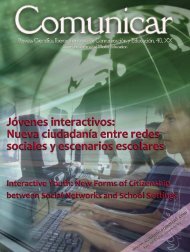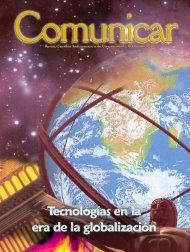Comunicar 39-ingles - Revista Comunicar
Comunicar 39-ingles - Revista Comunicar
Comunicar 39-ingles - Revista Comunicar
You also want an ePaper? Increase the reach of your titles
YUMPU automatically turns print PDFs into web optimized ePapers that Google loves.
160<strong>Comunicar</strong>, <strong>39</strong>, XX, 20121. IntroductionThere has been a remarkable increase in internationalstudies on formative assessment, and the conceptof assessment has aroused interest not only froma pedagogical point of view, but also from the strategicand even economic perspective, leading to a redefinitionof the concept.In our study we focus on online formative assessment,and our initial research reveals elements that areidentical to those found in any assessment method andwhich have to be contextualized according to the specificlearning situation to be observed, measured andimproved. In their studies, Gikandi, Morrow & Davis(2011) state that assessment (whether formative orsummative) in online learning contexts includes characteristicsthat differ from face-to-face contexts, especiallydue to the asynchronous nature of the participant’sinteractivity, which means that educators mustrethink pedagogy in virtual settings in order to achieveeffective formative assessment strategies.As we pointed out in a previous analysis (Blázquez& Alonso, 2006), prior to 2005 the most commontopics in e-learning settings were the categorization offormative and summative assessments (Birnbaum,2001; Wentling & Jonson, 1999), models such as theInput-Process-Output Model (Mehrotra & al., 2001)and others with similar elements (Stufflebeam, 2000;Rockwell & al., 2000; Potts & al., 2000; Forster &Was hington, 2000; Moore & al., 2002).More recent studies have focused on formative e-assessment which, as Rodríguez & Ibarra (2011:35)point out, «relies on the open, flexible and shared conceptionof knowledge, emphasizing the use of assessmentstrategies that promote and maximize the student’sformative opportunities». In this sense, Ooster -hoff, Conrad & Ely (2008) stress the importance of formativeassessment in online courses. In our context,Peñalosa (2010) states that to identify the progress ofinteractive and cognitive processes in formative virtualsettings it is necessary to formulate a valid, sensitive strategyto assess performance, together with a series oftools that enable us to identify changes in the complexityof knowledge-building on the part of the students.Weschke & Canipe (2010) present assessmentguidance aimed at teachers, in which they highlight aninteractive assessment process that uses indicators suchas assessment of student courses, self-assessment, submittedactivities and rubrics, all of which makes cooperativeassessment more valuable for professional development.More recent studies present two innovative toolsfor the assessment of virtual settings: eRubrics andvideoconferences. Serrano & Cebrián (2011) aredeveloping an eRubric system in Higher Education inwhich the student becomes the main assessor of theprocess. This implies a methodological change in theconception of the e-assessment agent who by traditionhas always been the teacher. Regarding the use ofvideoconferencing, Cubo et al (2009) urge the installationof Virtual Synchronous Classrooms as learningenvironments in Spain, and Cabero & Prendes (2009)pointed out that initial assessment (debate on previousknowledge), processual assessment (monitoring thestudents’ interaction) and final assessment (oral presentations,oral exams…) could all be done via videoconference.We consider it necessary to continue with theinnovative educational proposal, since it is the forma -tive methods and strategies that will establish the use oftechnology and not the other way round since, asSancho (2011) states, technology in itself does notentail formative innovation and it can even reinforceconservative behaviour and discourage participation.E-learning is enabling teacher and students to explorenew formative and collaborative methods with the flexibilitythat conventional educational structures areunable to offer.Our interest in trying out an innovative formativee-assessment system led our research team to design aspecific proposal for an online Secondary EducationSpecialist course aimed at graduates from Spanish,Portuguese and Latin American universities wishing totrain as secondary education teachers. Our virtual learningproposal considered an environment that wasdesigned to be flexible, based on access to original andvaried sources, and with the students as active participantsin their own training, accompanied by a team ofcoordinated and inter-functional teachers who sharedresponsibility for the process both individually and in agroup setting. In this process the interaction formulaswere negotiated and priority was given to problem solving,alternating individual and collaborative work,and offering a rich diversity of materials (media) andcontinuous formative and comprehensive assessmentwith dialogue as the main premise.Throughout the course, the aim was for studentsto acquire the knowledge and skills necessary toreflect, analyze and criticize the main contents thatshape the formative aspects of a secondary or middleschool teaching in different Western countries andtrain them to carry out their functions at that level ofeducation.The constructivist approach implemented in thecourse was based on a virtual training design executed© ISSN: 1134-3478 • e-ISSN: 1988-3293• Pages 159-167



